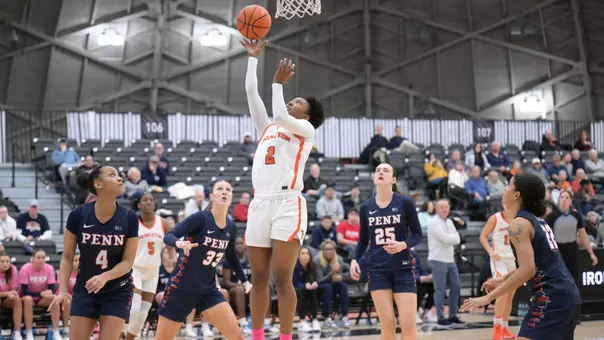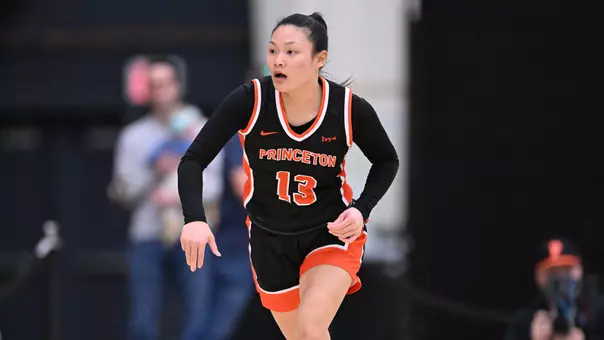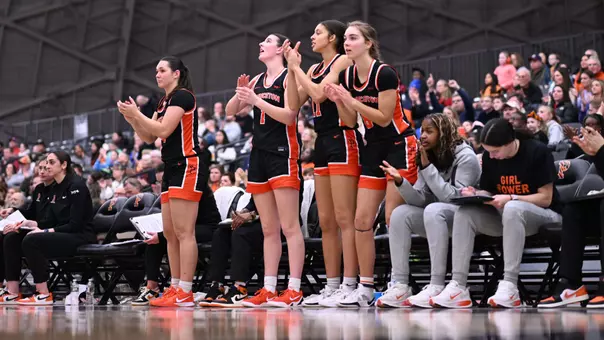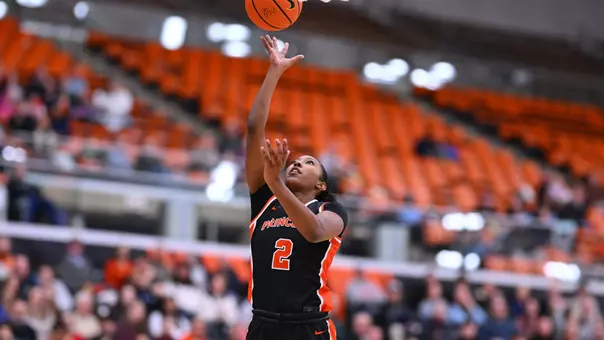Princeton University Athletics
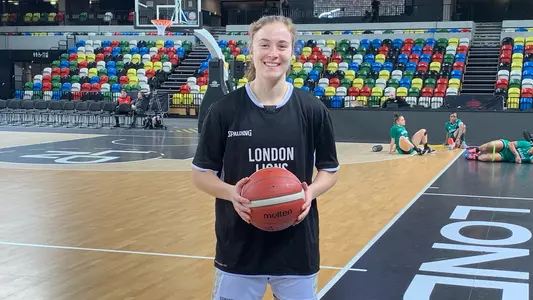
Feature Story: Life On The Run With Abby Meyers
December 26, 2023 | Women's Basketball
“Victory is fraught with as much danger as glory. Victory has very narrow meanings and, if exaggerated or misused, can become a destructive force. The taste of defeat has a richness of experience all its own. Beyond all the years of practice and all the hours of glory waits that inexorable terror of living without the game.” — Bill Bradley, Life On The Run
DURHAM AND LONDON, ENGLAND — About 250 miles straight north on the A1 from London and about 80 miles straight south from the border between England and Scotland on the same motorway sits the very old town of Durham. How old? Anglo-Saxon monks founded Durham in the year 995, and for the next nine centuries it served as a buffer between English armies and Scottish armies.
In that context, Lee Davie has not been at Durham University for all that long. In contemporary terms, though, he can be considered the long-time coach of the Durham Palatinates women’s basketball team.
Durham University is the third oldest in England and by all accounts the third best, trailing only Oxford and Cambridge on both lists. Athletically, though, Durham is the closest thing this country has to the American system of college sports. The entrance to the school’s athletic facilities, about a mile from the center of the town, proudly boasts of Durham’s successes, with multiple national championships across 18 sports and the designation, again, as England’s Sports University of the Year for 2023.
History, both old and recent, is not on Davie’s mind at this moment. His team is about an hour away from its next Women’s British Basketball League game — the final game of the calendar year 2023 for the Palatinates — and he knows even before tip-off what to expect.
The WBBL is an 11-team league. His team sits in ninth place, with wins over the Manchester Giants and Nottingham Wildcats. The Palatinates are unique in this league, though. Every player on his team is a graduate student, meaning that his team is a little younger and a paid a lot less than the rest of those in the league.
“We’re an NCAA team in the WNBA, to put it in American terms,” he says.
His opponent in this game is the London Lions. If Durham is an NCAA team in the WNBA, then the Lions are on the opposite end of the spectrum. Pick a random player or fan of any other team and you’re likely to hear the Lions referred to “the Yankees of the WBBL.”
As Davie sits and chats, his players warm up in front of him. The team from London comes out of its locker room and begins its warmups as well. The Lions play in the WBBL, in which they are undefeated, and for the EuroCup, a championship event for the top club teams in Europe. They are two days removed from a game in Turkey in the first meeting of a home-and-home first-round playoff series against Turkish side Bursa. They are here in Durham after a long, early-morning train ride on the day of the game, having flown back to London from Instanbul the day before.
Talking to Davie for even a few minutes tells you pretty much all you need to know about him. He is amiable. He is friendly. He loves basketball, and he loves his team. He loves how they compete, and he loves how they play together.
He is sitting on a folding chair on the team side of Arena B. It’s a relatively new facility, but Arena B is more like Gymnasium B, with Saturday morning little kids basketball about to wrap up on the far side. The floor has lines for basketball, as well as team handball, badminton, indoor field hockey and volleyball. There are no permanent stands here. There are supposed to be and eventually will be, but today there are only folding chairs for the fans.
“It’s a new building,” Davie says. “When the manufacturer started to put the seats in, they were ruining the floor, so they had to be taken out. We’re in a dispute with them now. It’ll get fixed.”
He doesn’t seem concerned about the bleachers. He doesn’t come across as the kind who gets too stressed about things. Then he sees No. 20 on the Lions. She is healthy now, and that fact has him stressed.
“Lucky me,” he says. “Abby Meyers is back just in time to play us.”
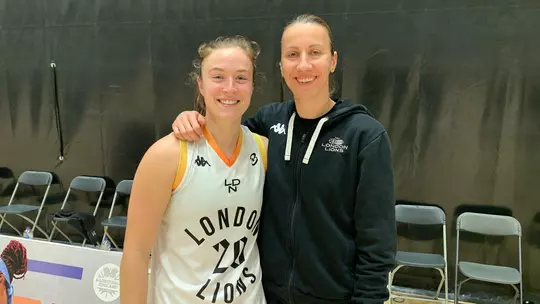
Yes, it’s that Abby Meyers, Princeton Class of 2022. It’s hard to believe, but it’s been only 21 months since Meyers was the unanimous Ivy League Player of the Year who then torched Kentucky with 29 points in the first round of the NCAA tournament as Princeton took down the Wildcats.
She is in her first season with the Lions. It is her first entry into the world of professional basketball in Europe, and she is, in her words, “loving everything about it.” She had a foot injury for the first two months or so, but she’s almost 100 percent now, which means that she’s back to being the Abby Meyers who can do anything on a basketball court.
She has worn five different uniforms in these last 21 months. She’s been a Tiger (Princeton), a Terrapin (Maryland), a Wing (Dallas, of the WNBA), a Mystic (Washington, also of the WNBA) and now a (London) Lion. She’s worked through injuries and being cut — failure, she says, is important and needs to be embraced — not to mention her first experiences as a professional basketball player on two different continents. Through all that, she has not forgotten where it all began for her.
“I am,” she says, “a Princeton Tiger at heart, and I always will be.”
She’s clearly the same Abby Meyers that she’s always been, which is to say that her every move suggests joy and that her joy is contagious. She plays basketball with a perfect mix of competitive fire and love for the game, both of which show all the time.
“It took her about 10 minutes from the time she got off the plane to fit right in,” says teammate Holly Winterburn, one of the best English women’s basketball players ever despite being only 23. “She’s been great to have around.”
The head coach of the Lions is Stella Kaltsidou, whose own playing career recently ended after 17 years with the Greek national team and 20 years of pro ball in Europe. Kaltsidou is tall and thin. She’s dressed casually in a black warm-up suit, with her light brown hair pulled back in a ponytail. From across the court, she looks almost exactly like Princeton head women’s coach Carla Berube. Up close, that thought doesn’t change much.
“That’s good for her then, isn’t it,” Kaltsidou says with a laugh when told of the resemblance.
As the game begins, her team looks like it just played two days earlier, took a flight back one day earlier and got up first thing that morning for the three-hour train ride to get here for the 1 pm tip-off. London leads only by a 26-20 score after the first quarter (the game is played in four 10-minute quarters, without media timeouts).
Kaltsidou conducts herself on the sideline much like Berube does. She stands for the most part with her arms crossed. When she wants to call the refs attention to what she thinks is a bad call, she manages to get her point across without becoming animated. Even though the game is closer than she might have hoped early on, her demeanor never changes. She is calm, and she is completely in control. It’s quite Berube-like.
The Lions outscore Durham 29-11 in the second quarter to make it 55-31 at the break. The Palatinates play hard for the 40 minutes, but they are figuratively, if not literally, out of their league. The final is London 111, Durham 69. Meyers showcases her all-around game, falling three assists short of a triple-double with 16 points, 13 rebounds and seven assists in only 27 minutes. After scoring seven points in each of her first two games back from injury, she then had 28 in 22 minutes in a win over Nottingham before the Durham game. She is clearly getting back to game shape.
“Abby is great,” Kaltsidou says with her Greek accent. “She’s got so much positive energy. She’s very vocal, and she’s always keeping the team together. Off the court, she’s just a really, really nice person. We love having her with us.”
When the game ends, the teams shake hands. Davie comes over to Meyers to congratulate her on her game and tells her that he hopes she stays healthy the rest of the season. The players shower and then meet in the building lobby for a quick post-game meal. After that, it’s back to the train station and and the return trip to London.
The team has reached the holiday break at 6-0 in the WBBL, a game ahead of the Caledonia Gladiators and Leicester Riders, who are both 5-1. London hasn’t played Caledonia yet, but it has beaten Leicester 77-61 in its closest league game to date.
“Thanks for coming,” Meyers says before she heads into the lockerroom. “Are you coming Thursday? You have to come Thursday.”
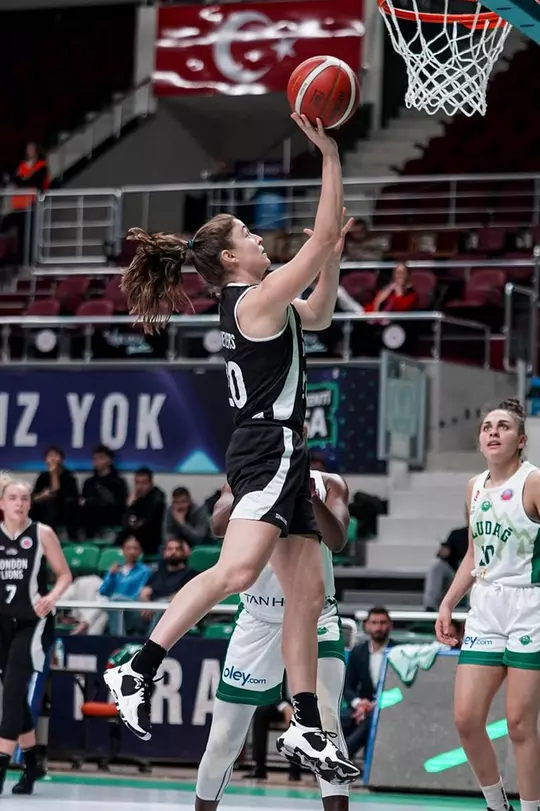
“Life in London is amazing,” Abby Meyers says.
Of course it is. She’s 24 years old. She lives in apartments that made up the 2012 Olympic Village. She’s a professional basketball player in one of the world’s greatest cultural centers, and she has dedicated herself to two things while she’s here: 1) becoming the best professional basketball player she can be and 2) not missing out on the experience.
“There’s so much to do that you can’t get bored here,” she says. “There are so many various activities. The food is amazing. There are so many people you meet. There’s a large Princeton community that is from London or has traveled to London, and I’ve been able to reconnect with a lot of Princeton friends.”
She spent the first two months here working hard to get back on the court. The Lions usually play one game a week, or two if there are EuroCup games to be played. They also practice every other day. It’s a great experience, but it’s also a business.
“My job is to play basketball,” she says. “I don’t have school or other extra-curricular things to do. I do have some new hobbies, and I’ve found a lot of fun things to do. I’ve read a lot of good books. But this is a different world. You have to be a professional about it.”
If you told her eight years ago or so that she would be a professional athlete in London after her college career ended, she might not have guessed basketball. Meyers came to the world of competitive basketball at a rather late age and didn’t really play at anything higher than a rec level until after middle school. She grew up outside of Washington, D.C., and was a standout athlete at Walt Whitman High School. She won two state championships, in fact — in soccer.
“I got started in sports at a very young age,” she says. “I played basketball, soccer, tennis and golf and swam. I never played competitive basketball until high school really. Before then, it was on rec leagues or teams where my friends were on them. Around middle school, I developed an extreme love and passion for the sport. I had my parents and sisters play with me and rebound for me.”
Despite the late start, she scored 1,700 points at Walt Whitman and became an ESPN Top 60 recruit. She averaged 9.4 points per game as a freshman under Courtney Banghart in 2017-18, ending the season with a team-best 13 points against Maryland in the NCAA tournament, and then, after missing the 2018-19 season, she came off the bench the following year while averaging 14.7 minutes and 6.3 points.
“The foundation of my defense started at Princeton with Coach Berube,” she says. “I realized that in order to get on the court, I had to be a reliable defender.”
It worked. The next year, her senior season of 2021-22, she upped the defensive intensity, going from 44 steals her first two years combined to 42 as a senior and from 17 blocked shots those first two years together to 15 more as a senior. As a result, she basically doubled her playing time to 29.3 minutes per game. She also became an offensive force, averaging 17.9 points per game and reaching double figures in all 30 games that season, and the 29 points against Kentucky gave her 12 games with at least 20 points.
“My overall experience at Princeton was transformative,” she says. “If I had gone anywhere else for undergrad, I’m confident I would not be where I am today. Princeton gave me an appreciation for hard work regardless of if it pays off or not. I also think it helped morph my determination and perseverance as an elite athlete but also a student. Princeton is a community that I can always lean on, and I am forever grateful for that.”
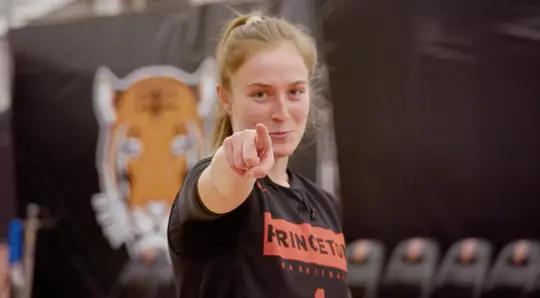
With her Princeton eligibility exhausted, Meyers graduated with the Class of 2022. For her post-graduate year, she chose to go close to her hometown and played at Maryland, where she averaged 14.3 points per game, became a second-team All-Big Ten selection and was named an honorable mention All-American for the second time. She had eight more 20-point games, and her college career ended with 14 points in a Regional Final loss to South Carolina.
She was drafted by the Dallas Wings with the 11th pick of the WNBA Draft and then, after being released at the end of training camp, signed on with the Washington Mystics, for whom she played nine games and averaged 1.4 points.
“The WNBA is so competitive,” she says. “You have to be so mentally consistent. I’ve always been a scorer, but the WNBA has scorers everywhere. You need to be a shooter. I learned a lot from the training camp with Dallas that I wasn’t consistent enough, that I needed to become a great shooter.”
To play in the WNBA was a dream come true for her. To get cut before it happened was a great life-lesson.
“I’ve learned to use all of my mistakes and failures,” she says. “I’ve had many failures, and they’re great learning experiences. The competitiveness, the basketball skills — they were all acquired at Princeton — but so was the value of failing. Failure turns into wisdom. Princeton is where that all started for me.”
Kaltsidou had never met Meyers before the team signed her, but she had seen video of her.
“I really liked the way she played,” Kaltsidou says. “She’s doing very well. This is a new experience for her. It’s her first time abroad and away from college, and then she had the injury at the beginning. Now that she’s back, she’s adjusted very well. She’s such a hard worker. Time will tell for her, but she’s going to get better and better I think.”
The team she joined was already strong. Its leading scorer at just under 20 points per game is Karlie Samuelson, a Stanford alum who is shooting a ridiculous 70 percent from three-point range in WBBL games. Megan Gustafson, a lefthanded post player, is next at 16 points per game; if her name is familiar, it’s because she had been Iowa’s all-time leading scorer until Caitlin Clark broke her career record earlier this season.
Most of the team has some U.S. college and WNBA experience. There’s even another Ivy League alum, Temi Fagbenle from Harvard, who was the 2013 Ivy League Rookie of the Year and a first-team All-Ivy selection who also won a WNBA championship with the Minnesota Lynx. Fagbenle was born in the United States, essentially grew up in England and then went back to the U.S. for high school and college, first with Harvard and then at USC.
Winterburn, who averages 13 per game, played for a year at Oregon but came back to England for the rest of her time “at Uni,” as they say here. Against Durham, Winterburn threw an amazing no-look pass to a cutting Fagbenle for a layup for one of her seven assists to go along with 17 points.
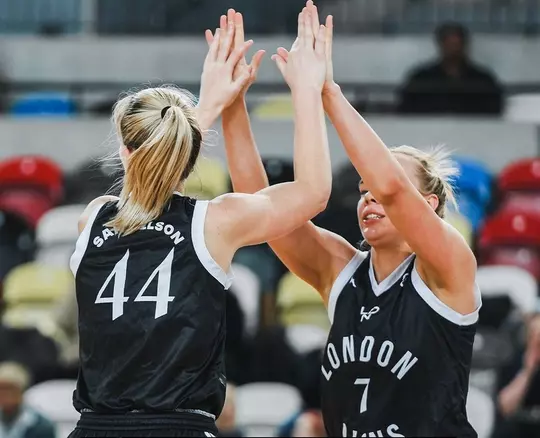
There are 14 players in all, of whom nine have British passports and three have other European passports. The rules allow for only two Americans, one of whom is Meyers and the other of whom is Juicy Landrum, who won an NCAA title at Baylor in 2019 and who holds the NCAA record for three-pointers made in a game with 14 (that’s correct, 14).
“I’d say that this team is somewhat ‘Americanized,’” Meyers says. “There’s definitely an American college element to it. The culture is very intense. You’re pushed, body and soul. They’ve made me feel at home. I have really amazing teammates and coaches. We have very talented athletes here. The team has definitely made my first experience playing overseas memorable and special. I’m very lucky to have chosen this team for my first year.”It could have been intimidating to step into that situation, especially since the Americans are expected to make major impacts. She also arrived with the injury. Instead of shying away, Meyers has embraced every moment of her time with the team.
“She’s been great,” says Winterburn. “Even when she was hurt, she brought her energy and did everything she needed to get back on the court. As a player, she has huge potential. She can really score. She has great awareness. I know she’s going to continue to get better.”
Winterburn knew of Meyers more from her year at Maryland, but she did know a bit about Princeton Basketball through her countryman Tosan Evbuomwan, who led the Princeton men to the Sweet 16 a year ago. Winterburn and Evbuomwan have met several times.
“I followed Princeton through that run,” Winterburn says. “I’m following Tosan now in the G League. He’s been playing great. We need guys like him, great British players. That’s the presence we need if we want British basketball to grow.”
The British women’s national team did not qualify for the upcoming Summer Olympics in Paris, though Winterburn is hopeful that the team will reach the Los Angeles Games in 2028, when she’ll be 28. There are certain factors that are definitely working in their favor in this country.
Meyers was right. You did have to be there Thursday. If you were, you saw the signs are everywhere.
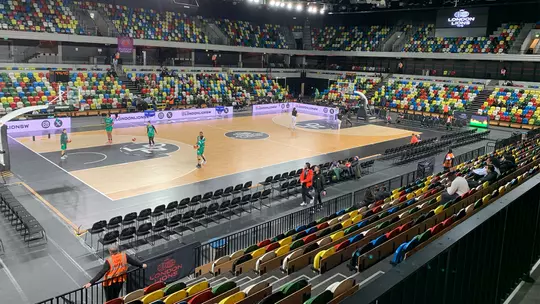
The doors to the Copper Box Arena — located in the Queen Elizabeth II Olympic Park — have just opened, and the first few fans have started to make their way into the building that hosted Team Handball in the 2012 Olympics (as well as the Princeton men’s team last season for the London Basketball Classic).
The arena seats 6,000 for basketball and is the wildly colorful home court for the London Lions men’s and women’s teams. On this Thursday night, the Lion women are in the second game of the two-game series against the Turkish team. The team that advances will be the team with the most total points in the two games (which means that the first game can end in a tie, and one game in the playoffs actually did).
Becky Power, who teaches primary school, and her 13-year-old daughter Elsie are among the early arrivals. They’ve taken the short train ride from Kent into London to see the Lions’ men before, but this is their first women’s game. Gymnastics was the sport for Becky and her younger daughter, but Elsie is a budding basketball player. Her team is the Kent Crusaders, though she’s also been picked for the Aspire team, which is part of the English talent program for girls’ basketball.
Elsie is wearing a Los Angeles Lakers jacket. Her mother buys her a London jersey, No. 23, even though the team doesn’t have a No. 23. Elsie quickly puts it on with a huge smile.
Who are Elsie’s favorite basketball players?
“I like Steph Curry and Giannis,” she says of the NBA stars. She tries to pronounce Giannis’ last name but doesn’t quite get it.
It’s not hard to guess who her favorite women’s player is. It’s Winterburn. Who else would it be for a 13-year-old English girl?
“What about Abby Meyers,” she’s asked.
“I’ve heard of her,” she says. “My Aspire coaches have said her name a few times.”
Elsie is part of a generation of young women athletes who have been mesmerized by the English women’s national soccer team — the Lionesses as they’re known. In the last two summers, the English women have won the European Cup and made it to the final of the World Cup. The team members have become some of the most recognizable celebrities in the country, and there has been a skyrocketing interest in playing sports among the English girls like Elsie.
“As a teacher, I know a lot about the impact on sports for girls and how important it is,” Becky says. “You want to get these kids to keep playing sports as teenagers.”
As Becky and Elsie talk, the number of fans through the gates continues to get bigger. By gametime, almost the entire lower bowl is filled.
“I was worried nobody would be here,” Becky says. “We’re very invested in the women’s game, but there’s still a long way to go. It’s important for Elsie and the girls her age to see the women play the game and not just the men.”
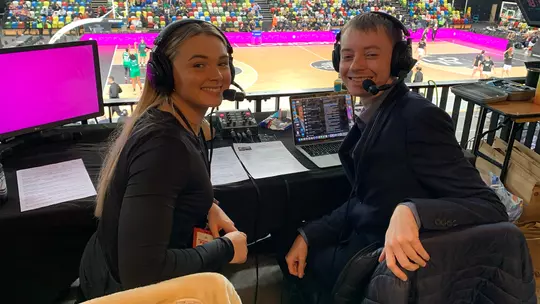
Part of helping grow the women’s game is getting it out to the kids like Elsie who aren’t at the arena. As such, up on the concourse, play-by-play man Michael Hanson-Morris and color commentator Beth Sarson are preparing for the night’s telecast, which will be sent out on TikTok.
Sarson is a player for the Oaklands Wolves, another team in the WBBL. The Wolves are 3-4 and have yet to take on the Lions.
“I should hate them,” says Sarson, who played collegiately in the U.S. at Division II Pfeiffer in North Carolina, “but I don’t. I have a lot of respect for them.”
Hanson-Morris knows all about the Lions and all about Abby Meyers.
“She has no weaknesses,” he says. “She can do everything well. She might be great at any one specific thing, but she does everything really well. I knew of her from Princeton and from Maryland, and now I’m excited to see her play.”
With its 25-point win a week earlier outside of Istanbul, London needs only to not be outscored by more than 24 in the rematch to take the series. On its best day, the Turkish team isn’t as good as London. This is not its best day.
About 40 minutes before the game, Meyers is wearing her white London uniform with a black warmup top. Her gameday routine doesn’t change much at all — she watches film, stays off her feet as much as possible, gets in a nap if she can a few hours before the game and then gets up some shots to gain her confidence.
“My confidence on the court comes from the preparation I do off of it,” she says.
She has followed that routine for this gameday, even though it’s turning out to be quite an unusual one.
“I’ve never seen anything like this,” Meyers says as she looks at the warmups on the other side of the court.
There are four Bursa players who are getting ready to play and a fifth who is standing and watching. That’s it. There are no other players and no coaches. Visa issues have prevented the rest of the team and the staff from being here. The one player who is standing and watching is Eda Sahin, who will play in the game despite an ankle that might be broken.
As the game begins, it’s clear this will be a mismatch. Sahin stands under the London basket while her teammates go up and down the floor, playing a four-woman zone on defense. It doesn’t help the cause that London can’t miss from three, making 13 of its first 17.
And then a funny thing starts to happen. There is a large Turkish fan base, and the Turks begin to sing and dance and exhort their team. They do the wave. They smile and laugh and cheer wildly at every made basket. The London fans appreciate the effort of the five-woman. The mismatch turns into something of a party. The English fans feed off of the Turkish fans. The building gets loud.
When it ends, the final score is 122-63, which is extraordinary considering the task for the Turks. The Copper Box Arena crowd gives the Turkish players a standing ovation. The London players and coaches salute their opponents. It has been a thoroughly entertaining 40 minutes of basketball.
The Lions finish the game 21 for 38 from three-point range. Katsiaryna Snytsina, who has been a professional for 24 years all over Europe and is the oldest player on the team, has a game-best 20 points, helped along by 4 of 5 three-point shooting. There are six Lions in double figures, including Meyers, who has 12 points and three assists, including a gorgeous behind-the-back feed to the cutting Fagbenle, in only 16 minutes.
The game advances London to the final 16 of the EuroCup playoffs. Kaltidou may look like Berube, but now she sounds like a different Princeton head coach, former men’s head man John Thompson III.
“I don’t know if we have a chance at the EuroCup,” she says. “For me, I focus game after game, day after day, and try to become better. The goal isn’t to win the EuroCup. It’s to win the next game. Yes, we have goals, but the goal is always the next game. Be better than we were in the last one. And then continue and continue and continue. Yes, our goal is to win the EuroCup. That’s every team’s goal. The question is what are we going to do to achieve that?”
The night has been a glowing advertisement for the quality and value of women’s sports in general. The effort of the Bursa players has been inspirational. The way the Lions play together is a blueprint for how to build a successful team. On this night, the team has made 50 baskets — and had 44 assists.
Ayo is an 18-year-old young man who has watched the game with his brother and mother. He’s a “football” player, he says, meaning soccer, of course. It’s his first women’s basketball game. Will he be back?
“Definitely,” he says. “I love how they play. The only thing is, next time I’ll come with my friends and not my mother.”
If you’re, say, a 13-year-old girl like Elsie, you couldn’t have asked for more out of your night. Meyers is the last player off the court. She does a 360 scan of the arena, taking it all in, before walking back to her bench. She has another plane to catch in a few hours, this one back to America and home for a short break before coming back for the rest of the season.
Her goal is to get back into the WNBA after her first season in London. It’s what she works for every day. It’s why she takes three-pointer after three-pointer in practice. It’s why she is dedicated to being in the best physical shape she can.
“I want to play this game as long as I can,” she says. “Basketball keeps giving to me.”
Becky and Elsie wait for her from their front row seat. Even if she needs to hurry out of the arena and get ready for her trip, Meyers comes by and is introduced. They pose for pictures. They talk for a good five minutes. Elsie beams. So does her mother. If Winterburn was Elsie’s favorite player before the game, Abby Meyers is as she leaves.
This is who Meyers is. She is a professional athlete, and a very approachable one at that. She loves the opportunity to talk to young players who might want to follow in her path. She knows how important that is. She knows what a role model she is.
There’s more to it for her, though. She loves what she’s doing, where she’s doing it and with whom she is doing it. Getting back to the WNBA is the goal. As her coach says, what is she going to do to make it happen?
The answer is a resounding “anything she can.” It’s ingrained in her.
It’s her DNA — the heart of a (London) Lion, the soul of a (Princeton) Tiger.
— by Jerry Price
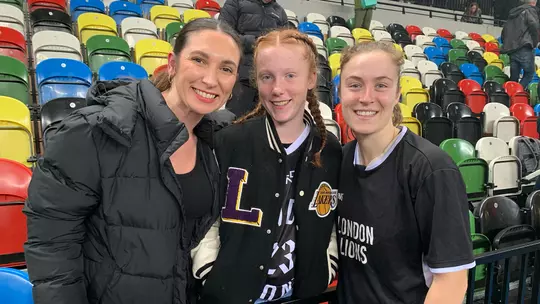




.png&width=24&type=webp)


